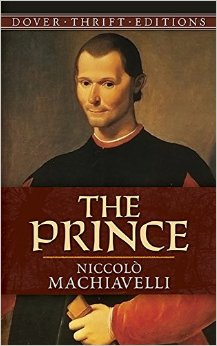
The Prince is considered by many as a “classic in the history of political thought” (Connell)
In the book The Prince, Machiavelli proposes many ideas on how to be a good leader and how to successfully govern cities and principalities. One of the many ways in which he explains his logic is through syllogism. Syllogism is a form of logical reasoning from which a conclusion is drawn based on two premises. Although the logic might seem undisputable that doesn’t mean that the conclusion is necessarily true. The following excerpt is an example of an instance where Machiavelli presents his premises from which he then derives his conclusion. The excerpt reads:
“For in truth, there is no sure way of holding other than by destroying, and whoever becomes master of a City accustomed to live in freedom and does not destroy it , may reckon on being destroyed by it. For if it should rebel, it can always screen itself under the name of liberty and its ancient laws, which no length of time, nor any benefits conferred will ever cause it to forget, and do what you will, and take what care you may, unless the inhabitants be scattered and dispersed, this name, and the old order of things, will never cease to be remembered, but will at once be turned against you whenever misfortune overtakes you, as when Pisa rose against the Florentines after a hundred years of servitude. If, however, the newly acquired City or Province has been accustomed to live under a Prince, and his line is extinguished, it will be impossible for the citizens, used on one hand, to obey, and deprived, on the other, of their old ruler, to agree to choose a leader among themselves; and as they know not how to live as freemen, and are therefore slow to take up arms, a stranger may readily gain them over and attach them to his cause”(Chapter V)
In this excerpt the first premise that Machiavelli presents is that it is hard to govern a city where men used to live free. The second premise that he makes is that there are cities and provinces in which the subjects are accustomed to living under the rule of a leader. Thus the conclusion that Machiavelli draws is that provinces where princes used to rule are easier to govern since the subjects aren’t used to living as freemen. The first thing that we check for is that the premises are accurate, because if that is not the case then the conclusion is automatically inaccurate. Furthermore, since the premises that Machiavelli presents are accurate then the conclusion is a sound conclusion.
“It is much safer to be feared than loved, if one has to do without one of the two. For the following may be said generally about men: that they are ungrateful, changeable, pretenders and dissemblers, avoiders of dangers, and desirous of gains, and while you do them good they are wholly yours, offering you their blood, their property, their life, and their children, as I said above, when the need is far off, but when it comes close they revolt” (91).
In this enthymeme Machiavelli starts with the conclusion, stating that it is better to be feared than to be loved if there had to be a choice between the two. He then supports this conclusion with the premise that men turn into ungrateful creatures when push comes to shove. The implied premise that can be taken from the available premise and conclusion is that human nature is inherently a bad thing. By recreating the enthymeme and looking at it as a syllogism we can see that the premises are very subjective since not everyone necessarily shares the same views as Machiavelli. However, for the sake of this example, if the premises were in fact true then the conclusion would simply be a valid conclusion since it would be logically correct. Deciding if the conclusion is a sound conclusion would be a matter of opinion but either way it would be hard to argue with Machiavelli’s logic that brought him to such a conclusion. In conclusion I think that the enthymeme is very logically coherent and that the conclusion does in fact follow the logic of the premises.
Image source: Google images
